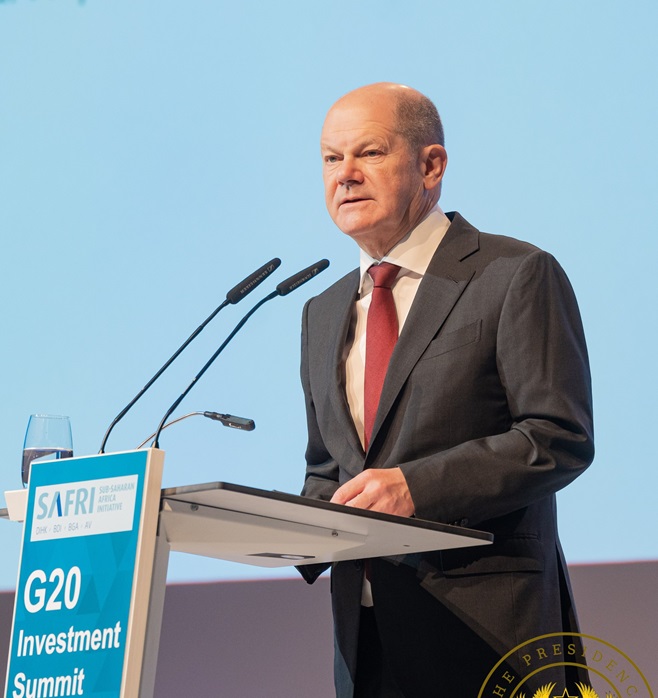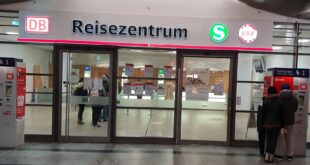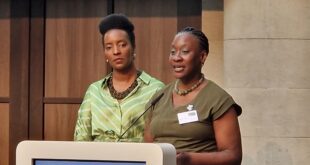Germany’s coalition government faces internal strife after a poor performance in the EU elections. With significant losses for SPD, Greens, and FDP, the coalition’s future is uncertain as calls for new elections grow. Sabine Kinkartz of the German international broadcaster Deutsche Welle (DW) reports
French President Emmanuel Macron is taking the bull by the horns. On Sunday evening, after being roundly defeated in the European elections, Macron announced a new election for the French parliament, the National Assembly.
Following the European elections, Chancellor Olaf Scholz, of the center-left Social Democrats (SPD), has also had to face up to the clear drubbing of his coalition government, known as the “traffic light coalition” because of the parties’ colors, with the environmentalist Greens and neoliberal Free Democrats (FDP).
The SPD is calling it a “bitter defeat” after the party’s worst outcome ever in a national election, with 13.9 %. There were also long faces among the Greens, who dropped to 11.9 %. The FDP came in at 5.2 %.

Surveys have long shown that about three-quarters of Germans are dissatisfied with the work of the federal government and the poll ratings of the coalition parties have long been in a slump.
But the European elections turned out even worse than expected. Even the far right AfD (Alternative for Germany) came out ahead of the governing parties with 15.9%.
The clear winners of the election are the Christian Democrats (CDU) and the allied Bavarian Christian Social Union (CSU), which together won 30% of the vote. Their strategy of turning the European elections into a test of approval for the coalition government paid off. “Another reason to vote for the CDU — the ‘traffic light’ coalition,” was the CDU’s slogan in the final days before the European elections.
New elections like in France?
CDU leader Friedrich Merz and CSU leader Markus Söder are calling for new elections in Germany. After a CSU executive meeting in Munich, Söder said that the European elections were a “vote against the traffic light coalition” and a “clear vote of no confidence” in the Chancellor.
Söder said Scholz had lost his legitimacy and the confidence of the electorate. “Olaf Scholz is a king without a country,” he said. If the traffic light government carries on like this, “people will be deeply frustrated.”
But the coalition government is not considering new elections — not even “for a second,” government spokesperson Steffen Hebestreit said on Monday. In Germany, the next Bundestag election is expected to be held in the fall of 2025. “We will achieve what we set out to do,” he said.
That is probably also because of the fact that the German chancellor — unlike the French president — would probably be out of office if new elections were held. The French president is elected directly by the people and Macron is set to remain in office until 2027. The German chancellor is elected by a majority of MPs in the Bundestag.
New elections pose risk for SPD, Greens and FDP
In the interests of political stability, it is not that easy in Germany to dissolve the Bundestag and call new elections. That would only be possible if the Chancellor cannot get a majority of MPs in parliament to back him. In this case, Scholz could apply to the Federal President to dissolve the Bundestag and call new elections.
But the SPD, Greens and FDP would have no interest. In addition to losing the chancellorship and their power to govern, many MPs would also likely be afraid of not being re-elected to the Bundestag.
This raises the question of whether the fear of losing power will be enough to overcome the rivalry and problems in the coalition. The relationship between the SPD, Greens and FDP has not been good for a long time.
Political disputes are a daily occurrence, and it is been repeatedly made clear that the political interests of two fundamentally left-wing parties and one economically liberal party are very far apart.
This is one reason for the Social Democrats’ poor performance in the European elections, SPD General Secretary Kevin Kühnert said after the party’s executive committee met in Berlin. He also stated that it should not be overlooked that this is also due to the conduct and perception of the ruling coalition.
In recent months, the coalition partners have repeatedly warned each other that their work must improve and become more constructive and goal-oriented. Little has come of it, and according to Kühnert, at any rate, there is a growing realization that the conflicts will not go away. “It’s simply not realistic to assume that everything will run smoothly the next time around if everyone just pulls themselves together.”
Infighting over 2025 federal budget
An even bigger dispute is likely on the horizon. On July 3, the federal government plans to present its draft for the 2025 federal budget.
There is a multibillion-euro gap between what the state is projected to take in and what the parties want to spend. Federal Finance Minister and FDP leader Christian Lindner is keeping quiet about exactly how big the gap is, but estimates range from €25 billion to €50 billion.
Lindner would prefer to save money by cutting social spending in order to comply with the debt brake. Anchored in the German constitution, the rule stipulates that the state may only spend as much money as it earns. Many in the SPD and the Greens, on the other hand, would like to lift the debt brake and plug the holes in the budget with fresh loans.
Weakening the debt brake would require finding another political majority, Lindner warned before the European elections. Budgetary discipline is a political credo of his party, and it cannot afford to back down on this point politically. They would rather leave the coalition.
Scholz is determined to keep the alliance together. This is why he has shown his full agreement with Lindner on the debt brake. To the chagrin of the SPD, which could be heard grumbling about this even before the European elections. “What is not acceptable is simply cutting 30 or 40 billion from the federal budget,” said SPD co-leader Lars Klingbeil.
Future of the coalition
Kühnert said it was obvious that the SPD would not support cuts that would jeopardize social integrity. Kühnert said he could not imagine “any scenario” in which the SPD would agree to such a budget.
“Pure social democracy, more SPD in the coalition” — these are the demands that are being sent from the party headquarters to the Chancellery. Will Scholz be able to deliver? So far, Scholz’s approach has been to score points with levelheadedness and make a name for himself as a moderator. For the European elections, he presented himself as the chancellor of peace, but that obviously didn’t work.
Scholz appears neither despondent nor pensive about the election defeat. On election night, he strolled through the election party at SPD headquarters as if nothing had happened, calmly taking selfies with his colleagues.
The crisis shows once again that Scholz is not the type to just throw in the towel. On the contrary: opposition and defeats have not been able to stop him. In his political career of more than three decades, this has been proven more than once. When he is knocked down, he just gets up and carries on undeterred.
But FDP leader Christian Lindner also shows little willingness to compromise. Although the FDP lost support in comparison with the 2021 Bundestag elections, it gained a little compared with the 2019 European elections. Linder interprets this as “a strong signal of stabilization that we also want to use politically.”
The Greens may already have an inkling of what lies ahead for the coalition. Green co-leader Omid Nouripour has warned the coalition partners that they must remember to “put the country before partisan colors.” This is especially true for the budget negotiations. As if he were almost pleading, he added that it makes no sense to “continue to fight this out in public.”
© DW
This article was originally written in German.
 THE AFRICAN COURIER. Reporting Africa and its Diaspora! The African Courier is an international magazine published in Germany to report on Africa and the Diaspora African experience. The first issue of the bimonthly magazine appeared on the newsstands on 15 February 1998. The African Courier is a communication forum for European-African political, economic and cultural exchanges, and a voice for Africa in Europe.
THE AFRICAN COURIER. Reporting Africa and its Diaspora! The African Courier is an international magazine published in Germany to report on Africa and the Diaspora African experience. The first issue of the bimonthly magazine appeared on the newsstands on 15 February 1998. The African Courier is a communication forum for European-African political, economic and cultural exchanges, and a voice for Africa in Europe.

































